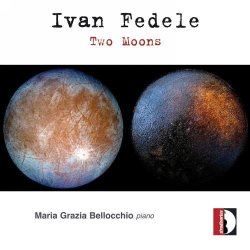|

|
Ivan FEDELE (b. 1953)
Suite francese (2003) [11:40]
Etudes boréales (1990) [13:10]
Two Moons (1997, rev. 2000) [10:52]
Due Notturni con figura (2007) [26:27]
Maria Grazia Bellocchio (piano)
rec. SugarMusicLab, Rome, Italy? 19-25 May 2009
STRADIVARIUS STR 33936 [62:14]
Ivan Fedele is undoubtedly one of the most important Italian composers of his generation. This is clearly in evidence from the number of commissions he has secured and continues to get as well as by the number of records devoted to his music. This Stradivarius release must be the third or fourth released by the label over the last few years. The one under review is entirely devoted to Fedele's piano music which spans nearly some twenty years.
The earlier work here is the set of Etudes boréales composed in 1990. The title alludes to John Cage's Etudes australes, but the similarity stops there. Fedele's suite is made up of five comparatively short movements, each possessing its own character. Moreover they are études in so far they explore various aspects of piano writing that will come to fruition. These aspects came together a few years later in the Piano Concerto of 1993. Nevertheless they are not études per se because the entire set is rather strictly organised. I am afraid that the relationship and various links between the movements will only be apparent through a thorough analysis of the score which is beyond my own capabilities. The music, however, may be enjoyed for what it is worth and that is very much indeed.
In 1983 Fedele published Armoons, a work for four pianos in which he explored a number of parameters of resonance and the like. He returned to the piece in 2000 — not 2009 as mentioned in the back cover of the jewel case — and arranged it as Two Moons for “due pianoforti e due strumenti virtuali”. This includes some electronics (“strumenti virtuali”) playing the parts of the first and fourth pianos. The original parts of the second and third pianos are played live by the same performer in this recording thanks to some multi-tracking. The virtual parts are thus present on pre-mixed electro-acoustic material exactly as they are written in the score. This is digitally elaborated but all the electronic workings are most tastefully done and really add to the sound image without useless interference. This may not be an easy piece but it is certainly a most rewarding one.
One might think that the very title of Suite francese alludes to the Baroque model or something along those lines but not so. The fact is that the Suite francese for piano — the original version was for harpsichord — is the first of a series of French suites. There is already a second one for violin which was composed in 2009 and there are others in the series - for cello and for flute. The title of these pieces actually reflects the fact that all these suites are dedicated to French musicians and French musical institutions. Do not go looking for Courante, Gigue and the like but be ready to hear some beautifully crafted piano music that generously repays repeated hearings. Incidentally, Suite francese for piano has three movements but they are not listed in the insert notes neither are those of Etudes boréales.
The most recent work Due Notturni con figura for piano and electronics is also the most substantial. It is also the one that demonstrates Fedele's absolute mastery both in his piano writing but also in his handling of live instrument and electronics. Once again, the electronic part of the piece does not obtrude. Instead it provides both structure and musical content that stands in homage to George Crumb and Debussy. In the first Nocturne one hears whale-song as in Crumb's Vox balaenae. In the second Nocturne there is a rather clear allusion to the mysterious world of Debussy's La cathédrale engloutie. All this says much of the strong poetic content of a substantial and quite beautiful work in which technique and poetic intuition perfectly blend.
Maria Grazia Bellochio is obviously a beautifully equipped musician whose impeccable technique and musical insight perfectly meet all the music requirements. She delivers assured and committed readings of these quite demanding works. Moreover her magnificent performances are caught in remarkably natural sound. It’s never hard-hitting but always clear and well-suited to Fedele's chiselled piano writing.
This is a splendid release and one that should appeal to all admirers of Ivan Fedele's music.
Hubert Culot
 |
 |
|











